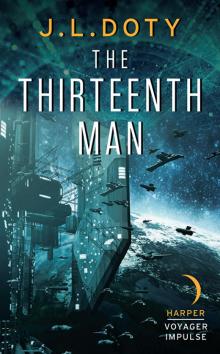- Home
- J. L. Doty
A Choice of Treasons Page 2
A Choice of Treasons Read online
Page 2
“The feddies are out there,” York insisted. “You can bet on—”
“No more excuses, Lieutenant,” Sierka interrupted. “You’re going to have to—”
“Enough!” Telyekev barked. “And don’t make excuses, York.”
“But sir, those feddies are out there. I know it.”
“We all make mistakes—you fewer than most—so don’t worry about it. Now what have you got on Trinivan?”
York let it drop and spoke carefully. “A dead com-tech, sir. And a half-hysterical comp-tech filling in for him. Sounds like chaos down there.”
“There you go, Sierka,” Telyekev said, making excuses for York. “That damn comp-tech probably doesn’t know a com from a weapons console. Probably caused that interference himself.”
“No doubt Your Lordship is right,” Sierka said.
A new face appeared on the screen carrying the signal from the embassy: probably Harshaw, an unattractive man, with a flat face and wide-set eyes. Like Lassen his face showed fear.
York spoke. “I believe Vice-Consul Harshaw is ready for you, sir.”
“Good,” Telyekev said. “Put me on without introduction. And you stay in circuit.”
York put he and Telyekev on a split screen to Harshaw. Telyekev wasted no time. “I’m Telyekev, Invaradin’s captain. I assume you’re Harshaw?”
Harshaw nodded. He seemed to know instinctively now was not the time to speak.
“We’re standing on full alert status, Harshaw, and neither of us has a lot of time. So bring me up to date fast, and don’t waste my time or yours with any bullshit.”
For an instant Harshaw appeared offended, but he adjusted to the situation quickly. He swallowed once, then spoke carefully. “We’re mixed up in a big power play on the part of some local politicos. For the last twenty years Trinivan’s been neutral, which is just another way of saying its government is loaded with factions that include hard core supporters of both the Syndonese and we imperials, and of course everything in between. But the in-betweens have lately been drifting toward the Syndonese, and the imperial sympathizers are now badly out numbered. And this unscheduled visit of Her Royal Highness was like throwing fuel on an already hot fire. She—”
“Her Royal Highness?” Telyekev barked. “You have a member of the royal family down there?”
Harshaw frowned. “Why, yes. I thought you knew.”
“I know nothing,” Telyekev said. “Following standard procedure we down-transited two days ago to check in with Fleet. They told us you were in trouble and you needed help. That’s all. Beyond that I am wholly unaware of the situation down there.”
Harshaw nodded and collected himself for an instant. “The emperor’s daughter, Princess Aeya, arrived unannounced four days ago with an entourage of about fifty, apparently on a lark. Her arrival aggravated an already bad situation, though my intelligence sources suspect Directorate intervention here so I don’t believe she alone is responsible for this. In any case, whoever’s behind it started agitating shortly after she arrived and brought it to a head two days ago. With the active help of some local politicians, and the passive sanction of others, they whipped up a mob of several thousand supporters and stormed the embassy compound. They murdered about thirty of the embassy staff—literally tore them apart in front of our eyes—and ransacked most of the embassy. Those of us who are still alive are holed-up in the top two floors of the main embassy building. The mob controls the bottom four floors. We’ve deactivated the lifts, and have about a dozen marines guarding the lift shafts and the two emergency stairwells at either end of the building. We have no food or water, no sanitary facilities, no medical supplies, and very little ammunition left for the few weapons we have. The situation is critical, and becoming more so by the hour. And not coincidentally, the leaders of this mob started whipping it up as soon as you made transition, so they’re obviously being fed data by someone in the local government with access to off-planet scanning equipment. Something’s going to happen in the next hour, and when it does, we won’t be able to hold out for long.”
“What about feddies?” Telyekev asked. “Are they part of the mob?”
“Certainly there are Syndonese spies all over the place,” Harshaw acknowledged, “competing with all the imperial spies, I have no doubt. But as for any direct intervention by the Syndonese, I couldn’t say. We’ve been able to identify only a few of the mob’s leaders, and they’re all known locals with histories as empire haters.”
“Mr. Ballin,” Telyekev said. “Do you have any questions?”
“Yes, sir. I’d like to know if the mob is armed. And if so, with what kind of weapons?”
“They’re not heavily armed,” Harshaw said. “Not more than one in twenty, and their weapons are a mish-mash of knives, guns, and rifles of all sorts.”
“Any Syndonese issue weapons?” York asked.
Harshaw shrugged. “I wouldn’t know a Syndonese weapon from any other kind.”
“You’ve got a noncom in charge of your marines, don’t you? Ask him.”
“Right,” Harshaw said. “But he’s a she, and it’ll take a minute.” He looked at Telyekev.
“Go ahead,” Telyekev told him. “Lieutenant Ballin and I have to confer anyway.”
York switched off the external audio. “We’re off-line, sir.”
“Thank you, Lieutenant. Commander Rame. Compute a short transition hop into Trinivan nearspace.”
“Aye, aye, sir. But it’ll be difficult to be accurate. We’re already within heliopause.”
“Do what you can, Olin. Mr. Ballin, this is a job for your marines, don’t you think?”
A cold knot formed in the pit of York’s stomach. Several months ago Invaradin’s marine CO had taken a bullet in the face. Telyekev wanted an experienced officer in command of them, so he’d made York acting marine CO. York wanted to snarl that they weren’t his damn marines, but instead he said politely, “Yes, sir.”
“Very good, York. Mr. Sierka will relieve you at com.” Telyekev looked at his screen. “I see Harshaw’s back.”
York switched on the audio. Harshaw needed no warning. “Corporal Elkiss says she’s spotted several Syndonese issue weapons, though there aren’t too many, and they’ve all been projectile weapons, no power weapons.”
Telyekev shook his head. “Doesn’t really sound like feddies, does it York?”
“No, sir.”
Telyekev shook his head. “Any more questions, Lieutenant?”
“No, sir.”
“Then you’re dismissed as soon as Commander Sierka relieves you.”
York’s hands trembled as he punched in a call to the marine ready room. Master Sergeant Mieka Palevi, looking quite bored, appeared on one of his screens. The marines didn’t like regular navy, especially when they had to take orders from them, and the sergeant smiled with a special sneer he reserved for York.
“Sir,” Palevi said flatly.
There was never any small talk between them. “One hundred marines,” York said without emotion. “Full battle kit, plast-armor, and a fifty-fifty mix of radiation and projectile weapons. Short term rations. Hazardous situation, non-hazardous environment. Both assault boats fully manned and armed. Orbital drop to planetary surface, high G, crash priority. Got all that?”
Palevi’s look of boredom changed to a smile. “Of course, sir. Will there be anything else, sir?”
York couldn’t put aside the fact that no one believed him about the feddies. “Bring along two portable mortars and maybe a couple of portable rotary blast cannons. And have you got any antipersonnel gas that’s unpleasant but nonlethal?”
Palevi’s face broke into a broad grin. “Oh yes, sir. Some real nasty stuff, sir. How do you want it? Grenades, mortars, or sprayed from the boats?”
“All of the above. And scramble on it. I’ll be down soonest.”
“Aye, aye, Cap’em,” Palevi said, granting him the marine equivalent of his naval rank, though, as was customary among the marines he carefull
y mangled the pronunciation to distinguish it from Telyekev’s rank. The marines knew how much it bothered regular navy in general, and York in particular.
Sierka sat down in the seat next to York. “You’re relieved, Lieutenant.”
York lifted his hands off the console, acknowledged Sierka with a sloppy salute, stood and threaded his way through the darkened clutter of Invaradin’s bridge. He stepped into the personnel lift, cycled the lift hatch shut, and once alone he paused to retrieve a small container of pills from a sealed pocket in his fatigues. High G drop, higee drugs, he crammed a half dozen phets into his mouth and swallowed hard.
He returned the container to his pocket, growled “Hangar Deck, One Bay.” The ride, beginning to end, took little more than a heartbeat as the lift shot him downward at more than one hundred gravities, though the computer compensated the lift’s internal grav field so York felt nothing. But during that heartbeat he damned Telyekev a dozen times for making him acting-captain-of-marines. He was a ship’s officer. He didn’t belong in combat armor. Put him at a console, throw warheads at him that could crack a planet; that didn’t bother him half as much as stepping personally onto the soil of some godforsaken rock so some idiot with a rifle could take shots at him.
The lift door slammed open and York stepped out into service bay One. He caught a momentary glimpse of one of Invaradin’s two assault boats, appropriately named One, then someone slammed his chest plate hard against his ribs. He would have fallen but someone else behind him let him stumble into his back plate. They spun him about dizzily, dropped him into his leg plates and boots, checked his joints and seals. It was a routine they’d rehearsed many times, for he, unlike they, was forced to post duty as both ship’s officer and marine CO, and would never have time during an alert to stop by the ready-room for his gear. But it was more than that; it was a not-so-subtle reminder of who they were, and who he wasn’t. It was an insultingly familiar pair of hands—male or female—touching him momentarily where they had no right to touch him, all under the guise of checking his seals. It was insult, bordering on insubordination, but never in such a way he could call them on it.
Someone slammed his helmet down over his head, and while they were checking his neck seals someone else snapped the heavy reactor pack into place on his back. That done, the marines stepped abruptly away from him.
The suit began its initialization sequence, flashing readings and diagnostic data on the inside of his visor. He flipped the helmet visor up as Palevi stepped in front of him. Like York his visor was up; he smiled and slapped a pistol into York’s hand. “Yer sidearm, Cap’em,” he said, grinning that special grin of his.
York suppressed a snarl, looked at the gun in his hand. Palevi had chosen a grav-gun for him. Its gravity field accelerated a small fragmentation shell up to something over mach one. The shell would puncture armor, or flesh, then fragment. It frequently caused more damage than an explosive round.
York looked at the gun clipped to the sergeant’s thigh plate, a bluish-black, chemically-powered, heavy-caliber slug thrower. Every time York saw that gun he thought of the last marine CO, a desk jockey assigned to Invaradin with lots of rank and no experience. The marines had gotten into a pinch on some jerkwater planet and their new CO called Invaradin for fire support. Unfortunately he didn’t know how to call in fire support, and Invaradin cut her own marines to pieces. After it was over the new CO was among the dead, though oddly enough no shrapnel had touched him. He’d been shot in the face, his visor up, by a chemically-powered, heavy-caliber slug thrower.
York gave his sidearm a quick once-over, snapped it into the clips on his thigh plate without fully inspecting it.
“You had a chance to check out the news yet, Cap’em?”
York looked at Palevi quizzically. When they’d down-transited the day before to check in with Sector—and gotten the urgent message to rendezvous with Nostran and the Diana and proceed with all haste to Trinivan—after so many months out of contact they’d also received a standard transmission packet. York hadn’t had time to review it personally, but it would contain mail, promotions, reassignments, transfers, and an up-to-date summary of every newsworthy occurrence since they’d gone out on patrol. “No, Sergeant, I haven’t.”
Palevi’s grin broadened. “Darant bought the farm eight days ago somewhere in Orion. It’s been confirmed.”
York’s armor grew very warm. “Who’s the new SDO?”
“Sadeline,” Palevi said. “She’s on the Lonesome Star somewhere in this sector. You know, sir, with all your time on the clock, that moves you up to number two.”
“No it doesn’t,” he growled. “I can’t be SDO because I ain’t no god damn marine.”
Palevi shook his head. “Don’t worry about it, Cap’em. The closer you get to SDO the less likely you are to get shot. The way I figure it, them feddies don’t wanna kill you until the reward’s good.”
“Shut up!” York snarled. “Visors down and seal ‘em up, Sergeant. Short inspection and com check.”
“But, sir, we’ve already che—”
“I don’t give a damn. Do it.”
Palevi saluted casually. “Yes, sir,” he said, then shouted orders at his marines. They lined up quickly in front of One, their rifles held out for inspection, visors down. Palevi spotted something he didn’t like, did more shouting.
Someone behind York cleared his throat politely. “Um. Lieutenant?”
York turned about slowly, found Canticle Thring dressed in the long, archaic robes of a churchman. York didn’t have much use for the church; among crew he was not unusual in that. “What can I do for you, Canticle?”
The man seemed almost frightened of York. “I was wondering, Lieutenant, ah . . . if any of your people might care to be blessed before going into danger.”
York shook his head, couldn’t believe the man would ask such a stupid question about marines. “Sorry. No time for that.”
York turned back to Palevi and his marines, dropped his visor, felt his ears pop as his suit ran an automatic pressure check. A small square in the upper-right corner of the visor blackened and his suit computer displayed a stylized image of a suit of armor colored in green. A readout next to it told him they’d fully recharged the core of his reactor pack; he was carrying a capacity of well over fifty gigawatt-hours. “Computer,” he said. “Status, physical, execute.” The display on the inside of his visor changed to the silhouette of a naked man. The right knee and ankle were tinted a pale yellow; old wounds, old damage. The suit would keep the pressure seals around the knee and ankle slightly over-inflated to provide extra support, but beyond that, and some painkillers, there was nothing he could do.
He shrugged inwardly, keyed his com. “Count ‘em off, Sergeant.”
“Count ‘em off,” Palevi shouted.
“One.” “Two.” “Three.” “Four,” came the reply, each word spoken in a different voice. The damn marines were a breed apart. The empire couldn’t even keep them supplied in uniforms, but while their armor was patched and stained and blackened here and there, it functioned perfectly, like the marines themselves. They weren’t much to look at—not much to like, either—but when needed they functioned, and they functioned well. York had to admire them for that, if nothing else.
The count reached one hundred. York keyed his com. “Sergeant, is Private Dakkart dropping with us?”
“Yes, sir. I worked out—”
“I thought we agreed she wouldn’t drop again.”
“We did, sir. But she’s one of my best. I need her, so I made a deal with her.”
“What kind of deal?”
“I’d rather not say, sir.”
“I’ll bet you’d rather not say! Anyone else I should know about?”
“Yes, sir. Private Stacy. New man, green as they come. This’ll be his first hot drop.”
“Both of ‘em,” York said. “Front ‘n center.”
Palevi shouted orders into his com. Two figures broke ranks and sprinted forwa
rd to stand rigidly in front of York. They flipped their visors up, held their rifles out for inspection.
York’s ears popped again as he lifted his own visor, looked into the helmet of the shorter of the two. Female, not unattractive, with the fading remnant of a black bruise framing one eye. York kept his voice low. “You’ve got Palevi to thank for one more chance. But if you get into another brawl on this ship you’ll never drop again.”
She rightly said nothing.
York stepped sideways to stand in front of the new recruit. In the kid’s helmet York saw a young face with blond hair and blue eyes, and a chin that barely needed shaving.
“How old are you?” York asked.
“I’ll be seventeen next month, sir.”
Palevi leaned forward. “Excuse me, sir,” he said politely. He turned to the boy, bellowed at the top of his lungs, “The cap’em did not ask you how old you will be, private. He asked you how old you are. And when you speak to the cap’em you’ll address him properly. And I can’t hear you. Is that clear?”
“Sir,” the boy screamed. “Yes, sir.”
Palevi stepped aside, spoke calmly to York, “Sorry about that, sir.”
York nodded, looked at Stacy again. “How old are you?”
“Sir. Sixteen, sir,” the boy screamed.
“Who are you buddied with?” York asked.
“Sir. Mackin, sir.”
York shook his head. “Now you’re buddied with Private Dakkart here.”
Dakkart broke discipline. “But sir! I—”
Palevi shouted her down. “As you were, private.”
Palevi, Dakkart, and Stacy all turned into statues of very silent stone as York said, “See to the details, Sergeant.”
York’s com came to life with Olin Rame’s voice. “Stand by for transition.” There was a pause, then Rame barked out a short count-down sequence. York felt Invaradin up-transit, then almost immediately down-transit. Another pause, then, “Stable orbit in two minutes.”
York suppressed the panic crawling up into his gut and grumbled, “Load ‘em up, Sergeant.”
Palevi shouted more orders. The marines split into two squads, Palevi in charge of one, and a female corporal named Tathit in charge of the other. Tathit double-timed her squad through an air lock to Two Bay. Palevi and his marines scrambled into One’s open hatch. York, the last to enter, took the commanding officer’s position immediately aft of the hatch, a small recess that allowed him to be the first out in the drop zone. Like the rest of the marines he sat down and strapped himself in place and waited.

 Tranquility Lost
Tranquility Lost Of Treasons Born
Of Treasons Born A Choice of Treasons
A Choice of Treasons The Heart of the Sands, Book 3 of The Gods Within
The Heart of the Sands, Book 3 of The Gods Within The SteelMaster of Indwallin, Book 2 of The Gods Within
The SteelMaster of Indwallin, Book 2 of The Gods Within The Thirteenth Man
The Thirteenth Man J.L. Doty - Dead Among Us 01 - When Dead Ain’t Dead Enough
J.L. Doty - Dead Among Us 01 - When Dead Ain’t Dead Enough Child of the Sword
Child of the Sword The Name Of The Sword (Book 4)
The Name Of The Sword (Book 4) Child of the Sword, Book 1 of The Gods Within
Child of the Sword, Book 1 of The Gods Within